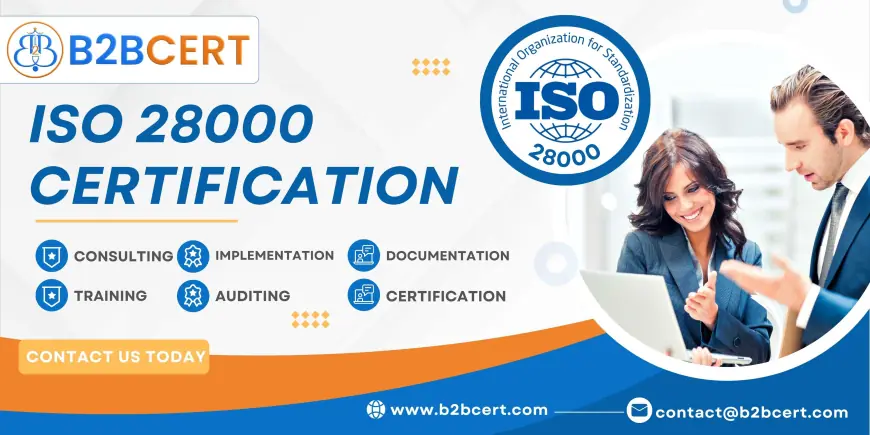ISO 28000 Certification : Enhancing Supply Chain Security
ISO 28000 Certification in South Africa ensures robust supply chain security management by identifying, mitigating, and managing risks throughout the supply chain. It helps businesses safeguard operations, enhance resilience, and meet international security standards, making it ideal for industries like logistics, manufacturing, and mining. This certification boosts stakeholder confidence, streamlines processes, and strengthens compliance with global best practices.

ISO 28000 Certification in South Africa is a globally recognized standard for Supply Chain Security Management Systems (SCSMS). This certification focuses on identifying, mitigating, and managing risks throughout the supply chain, ensuring seamless operations while addressing security concerns. In South Africa, where supply chain networks are critical to industries such as mining, manufacturing, and logistics, implementing ISO 28000 can be a game-changer.
In this blog, we’ll explore ISO 28000 implementation, the services available in South Africa, and the importance of ISO 28000 audits in maintaining compliance and operational efficiency.
ISO 28000 Implementation in South Africa
Understanding the Standard
ISO 28000 sets out requirements for a management system aimed at improving the security of supply chains. The framework integrates seamlessly with other management systems, such as ISO 9001 (Quality) or ISO 45001 (Health and Safety), making it adaptable for organizations with existing certifications.
In South Africa, companies face unique challenges in supply chain management, including crime, political instability, and disruptions caused by socio-economic factors. ISO 28000 provides a structured approach to mitigating these risks by enabling organizations to:
- Identify and assess risks at each stage of the supply chain.
- Develop contingency plans to respond to disruptions.
- Ensure compliance with national and international security requirements.
Steps for Implementation
Gap Analysis: Conduct a thorough evaluation of existing supply chain security practices to identify areas for improvement.
Policy Development: Define policies tailored to the organization's specific risks and operational needs.
Employee Training: Equip staff with the skills to recognize risks and adhere to security protocols.
Integration with Business Processes: Align the SCSMS with operational workflows to ensure security measures are practical and effective.
Regular Monitoring: ISO 28000 Implementation in Bangalore - Establish mechanisms for tracking the effectiveness of implemented controls.
ISO 28000 Services in South Africa
A range of services supports organizations in South Africa in achieving ISO 28000 certification. These include consultancy, training, and certification, tailored to the needs of industries operating in diverse environments.
Consultancy Services
Expert consultants assist organizations in preparing for ISO 28000 certification by:
- Conducting risk assessments and vulnerability analyses.
- Designing security frameworks that align with ISO 28000 requirements.
- Advising on resource allocation and technology adoption for enhanced security.
Training and Awareness Programs
Training is a critical component of successful ISO 28000 implementation. Service providers in South Africa offer:
- Employee Awareness Workshops: Focusing on risk identification and response mechanisms.
- Internal Auditor Training: Preparing staff to conduct internal audits and maintain compliance.
- Custom Programs: Tailored to address the unique risks faced by specific sectors, such as maritime logistics or energy supply chains.
Certification Bodies
Accredited certification bodies provide auditing and certification services to validate an organization's compliance with ISO 28000 Services in Bahrain. These bodies ensure impartiality and adherence to international standards, instilling confidence among stakeholders and business partners.
ISO 28000 Audit in South Africa
Audits play a vital role in maintaining the integrity and effectiveness of an ISO 28000-certified management system. They help identify gaps, verify compliance, and ensure continual improvement.
Types of Audits
Internal Audits: Conducted by trained personnel within the organization to review compliance and identify opportunities for improvement.
Certification Audits: Performed by accredited certification bodies to determine whether the organization meets ISO 28000 requirements.
Surveillance Audits: Regular audits conducted post-certification to ensure ongoing compliance and address any emerging risks.
Audit Process in South Africa
Pre-Audit Assessment: The organization conducts a self-assessment or hires consultants to prepare for the formal audit process.
On-Site Evaluation: Auditors visit facilities to assess the implementation of ISO 28000 requirements, including risk management practices, policy adherence, and operational controls.
Report and Certification: Following a successful audit, the organization receives ISO 28000 certification. Non-conformities, if identified, are addressed through corrective actions.
Benefits of Audits
- Enhanced Security: Regular audits ensure that security measures evolve in response to new threats.
- Improved Efficiency: Identifying redundancies and weaknesses in the supply chain can lead to streamlined processes.
- Stakeholder Confidence: Certification backed by regular audits demonstrates a commitment to security, boosting trust among clients and partners.
Conclusion
ISO 28000 Registration in Uganda is a powerful tool for organizations in South Africa looking to enhance supply chain security, improve operational resilience, and comply with international standards. By investing in implementation, leveraging professional services, and committing to regular audits, businesses can safeguard their supply chains against disruptions and build a competitive edge in the global market.
For organizations in South Africa, adopting ISO 28000 is more than a compliance requirement; it’s a strategic investment in sustainability and trust.












